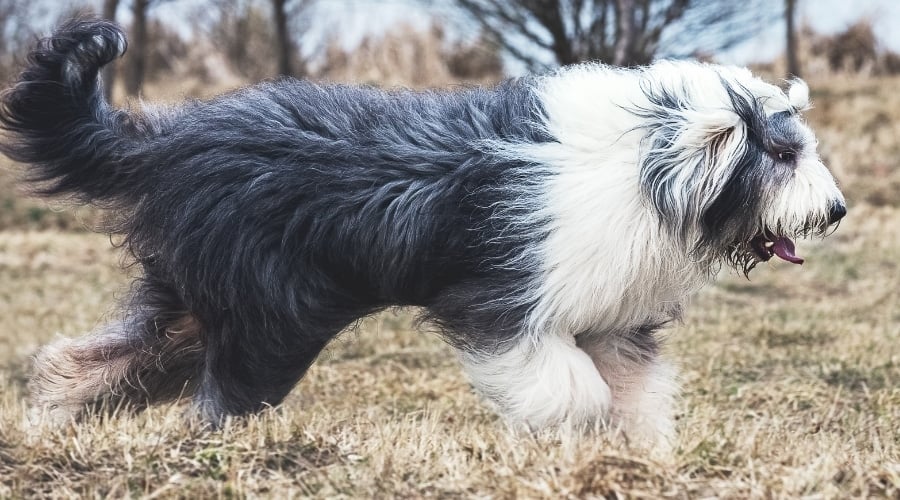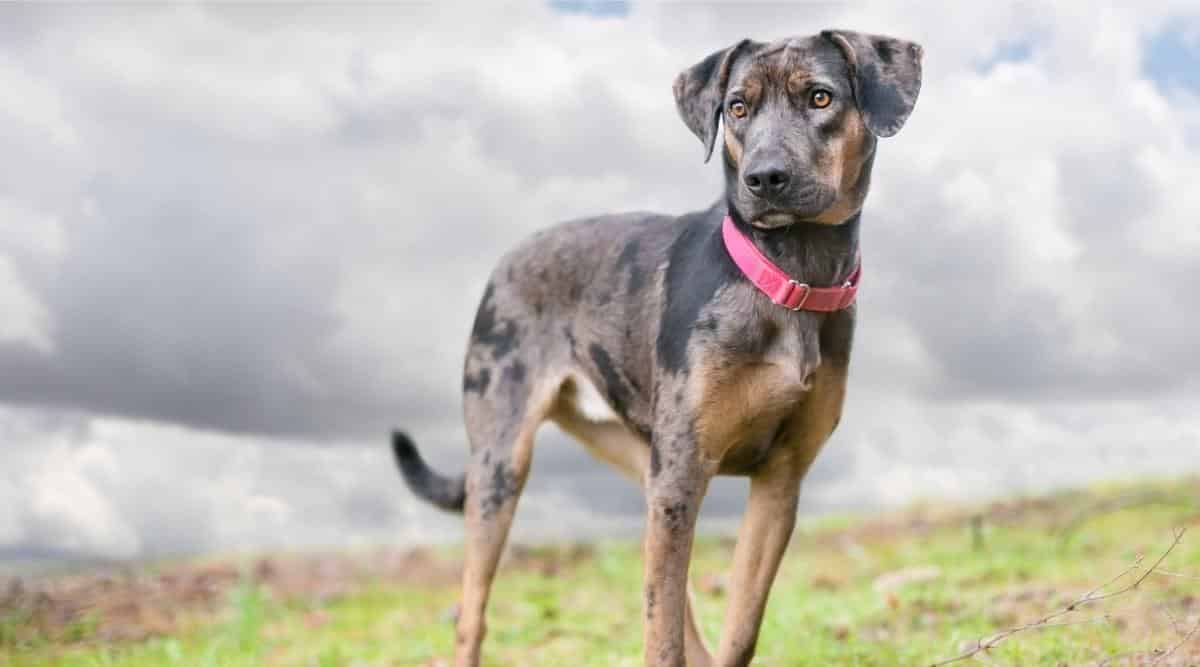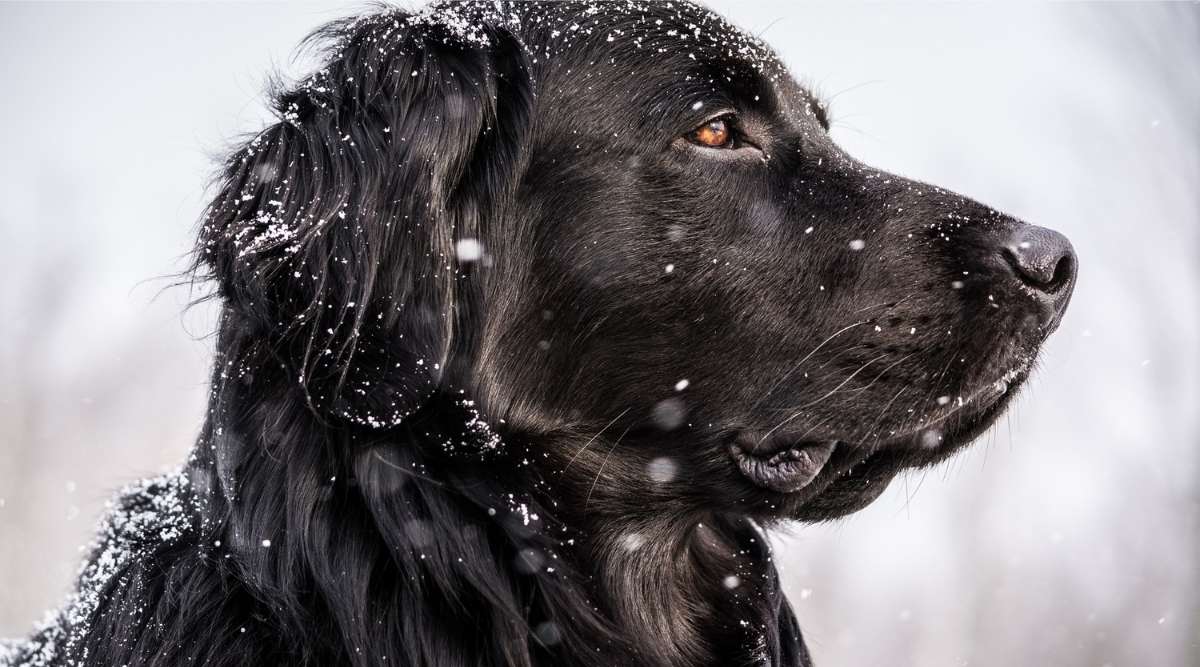Golden Retriever & Chow Chow Mix: The Beautiful Golden Chow
When you purchase through links on our site, we may earn a commission. Here’s how it works.
These two large dogs create the smart, protective, and gentle Golden Chow Retriever. You’ll find no better friend than the Golden Chow, as both dogs are kind-hearted, energetic, and large lap dogs. They’ll love to keep you company throughout the day.
Golden Retrievers are known for being kind, gentle, and sweet nanny dogs. They’re the perfect complement to large families. The Chow Chow, on the other hand, is known for their fantastic hunting abilities and their prowess as watchdogs. The Chow Chow is a low and boisterous pet, while the Golden Retriever is calm and patient.
Although the Golden Retriever is perfect for first-time dog owners looking for a large dog, I wouldn’t recommend the Golden Chow for inexperienced trainers. The Chow Chow is notoriously stubborn and smart, which can make them difficult to train at first.
Golden Chows thrive best in environments that have lots of space and a large, loving family next to them. They like to be doted on and love to receive affection from their favorite people in their homes. Would this big lovable babe be the right fit for your growing family? In this guide, we’ll take you through the daily lives of the Golden Chow.
Table of Contents
Large Designer Dogs
A “designer dog” is any mix between two purebred parents. For any mixed breed to be classified as a designer, the parents would have to be bred purely for generations up until the point of being bred with another breed. A true purebred dog will have puppies that have the same characteristics and temperament as their parents.
The benefit of owning a purebred with proper papers is you’ll have a good estimate of how your puppy will act. With a designer dog, you don’t have that luxury, as the puppies could take characteristics from either parent. However, this is the only true negative to owning a designer dog (unless you care about coat color).
Designer dogs are less likely to inherit diseases than their purebred parents, and this can be a lifesaver for certain breeds. Specifically, the Chow Chow breed because they’re prone to many health problems. Keep in mind that not all designer dogs have to be completely purebred, as some crosses require a less-even split.
Although these two breeds have little in common in temperament, they complement each other by being opposites! The Golden Retriever is a known sweetheart of the big dog community, while the Chow Chow is stubborn and smart. You’ll likely have a kind-hearted, well-mannered nanny dog on your hands if appropriately trained.
Golden Retriever Overview
The Golden Retriever is likely to have originated from British dogs in the 1800s, though it isn’t known all of the ancestors that this Retriever had to create the Golden breed. The St. John’s Dog that originated from Newfoundland, Canada, is the best guess, as they are the ancestors of the Tweed Water Spaniels, black Wavy-Coated Retrievers, and the Red Setter.
In the 1900s, they were imported to the United States and gained popularity as sweet and kind family pets. The American Kennel Club officially registered them in 1925. The Golden Retriever remains popular to this day due to their nanny-like qualities. They love children, other animals, and humans – even strangers.
The “Golden” in their name describes their gorgeous wavy, yellow fur color. They are a medium-sized dog with a broad and strong head. They are intelligent, affectionate, and even-tempered, love to play, and are eager to please you. They Respond well to obedience training and are great service dogs.
Great swimmers and bird dogs, if you have the room for them, they’re one of the best companions for any large family. They live anywhere from 10-13 years and stand 23 inches tall. They have a tendency to snore, drool, and have an average activity level. They are often compared to regular labs.
Chow Chow Overview
The Chow Chow likely originated over 3,000 years ago in China and is often recognized as one of the oldest breeds in the world. Genetically speaking, this breed is very similar to a wolf. The breed remained popular among the wealthy in China due to its innate protecting abilities and strength. They were good at sniffing out and finding smaller animals to be hunted.
They were eventually transported to long in the 1700s and then to the United States in 1890. The Chow Chow was one of the first breeds to be recognized by the American Kennel Club (1903). Although they were great working dogs and were strong enough to pull carts, the Chow Chow is now either a companion dog or a watchdog.
Chow Chows are pretty aloof and have lower energy requirements than other dogs. They prefer to lay down and protect you than play; it’s their own way of showing affection. They are known for being stubborn when training but are very intelligent and can be easily trained once they see you as Alpha.
If you have a lot of room for them and aren’t avid travelers, they will be great for your family if you have no small children. They don’t live long, unfortunately, and an average of 10-12 years. Chow Chows also drool a lot and have a tendency to snore.
Golden Retriever and Chow Chow Mix (Golden Chow)
It’s uncommon for mixed breeds to have a documented record, and the Golden Chow is no different. However, it is still possible to trace them as being bred in the last two decades. Most mixed breeds originated around that time and became popular in the late ’90s and early 2000s.
Their devotion is one of their prominent qualities, as the hybrid between the family dog and the protector means a loyal guard dog that craves your attention. This mix has made them less friendly with children and strangers, so if you want to bring out their Golden Retriever qualities, early socialization is required.
Golden Chows will need an average amount of exercise, and they don’t have boundless energy. Thirty minutes to an hour of running or vigorous playing should be enough for them. They will also inherit the Chow Chow’s stubbornness though it isn’t as prominent in the Golden Chow. Just be aware that you may have a brick wall during some training sessions.
Although not as friendly as the Golden Retriever, the Golden Chow is loving, social, friendly, and playful with the right socialization. They are large dogs and will average 50 to 75 pounds. Golden Chows require a lot of space.
Appearance & Grooming
The Golden Chow is a medium-sized dog that will have wavy, thick, dense, and non-water-repellent fur. The length of their coat depends on what they inherit from their parents, but it’s usually medium-length to full-length. They stand at 20-25 inches and have droopy ears with a long tail that has a slight curve. They’ll always have brown eyes and a brown snout.
You’ll often see their fur as a golden yellow, but blue, red, and black are also possible coat colors. It is possible for these pups to be larger than medium-sized, as the weight varies significantly in this mixed breed. It’s best to have more space just in case they do get to be on the bigger side.
Golden Chow’s aren’t considered hypoallergenic because they shed quite a lot throughout the year. You should brush them at least once a day, though twice is preferred to keep their coat healthy and without mats. Take your Golden Chow to a professional groomer every month to keep their fur trimmed.
Pay attention to their ears and their nails as well. You’ll want to see if their eats have no odor, moisture, or dirt buildup because that could indicate infection. Trim your pup’s nails every two to three weeks.
Training
Your Golden Chow will likely inherit the stubbornness of their Chow Chow parent. Don’t hold out for them being more like the Golden Retriever; it’s unlikely to happen. Since they’re stubborn, they will sometimes choose not to listen to you, even if they know what they’re doing is wrong. You’ll have to enforce yourself as the Alpha quickly.
Positive reinforcement is the best method for any dog. Do not try to slap them or scold them when they do something wrong, as your pup will grow to resent you and make them harder to train. Giving them treats or toys for a job well done will train them up fast.
Obedience training should be done as soon as they’re puppies so they can tell the difference between what you consider right and wrong. Dogs look up to their alphas for guidance and are less likely to disobey if they see you as an authority.
Most large dogs are easy to train to pee outside due to their larger than the average bladder. They can also handle being alone for longer than average between potty breaks. Take care to socialize them when they’re young, so they will grow to trust people. If you plan to crate train, you’ll want to make sure you get a crate that’s adequately sized for a Golden Retriever and a Chow, which is usually a larger size.
Exercise & Living Conditions
The Golden Chow has a moderate activity level requirement and needs, on average, 30 minutes to an hour of playtime per day. They love to play games like fetch or tug of war, swim, or go for a jog. Try to walk your pup at least once a day, but twice is preferred.
Golden Chow’s are no couch potatoes; they love to play with you and get plenty of fresh air. If you live in a hot climate, they might not be the best pet for you, though, as they’re coats will make them very hot from running around all day.
Although they can be outdoor dogs, they won’t like it very much. Try to keep them indoors as much as possible so they can receive your love and attention. Don’t leave them outside for more than a few hours, especially during extreme weather conditions.
Health
Similar to most big dogs, Golden Chow’s are prone to hip and joint problems and good develop hip dysplasia later on in life. This is an inherited disorder, so asking the breeder for the parents’ certificate to determine their health is a good idea. Still, you should prepare for this disorder in case it does occur.
Fleas are another issue with the Golden Chow because of their thick coat. If your dog is allergic to them, then an infestation will be more painful to them than it already is. Make sure they have their adequate shots and are taking medication to prevent fleas in the summer.
Watch your dog’s weight and most of the other health issues won’t occur like heart or eye problems. Larger dogs can also suffer from bloat, which can affect the heart and eyes as well. Bloat should always be taken seriously and can be fixed by lowering the amount of food given at feeding time.
Nutrition
Big dogs require a lot of nutrition! Make sure their diet mostly consists of protein and fats with low carbs. It’s better to give them natural or organic food for optimal health. You can also give them whole foods like vegetables and meat if you’d like.
Three cups a day on average is the vets’ recommendation, though you should pay more attention to the calories in the food rather than the amount given. The average price to feed your Golden Chow will be around $50. Feed them multiple times a day and with smaller portions to lessen the likelihood of bloat.
As Family Pets
Golden Chows are the perfect guard dog with a heart of gold, but are these medium-sized cuties the best for you and your family?
- The Golden Chow are loving, affectionate, loyal, and fond of their favorite person.
- They aren’t always good with children or other people, even with proper socialization.
- They require a lot of room with a large backyard.
- Don’t think about adopting this breed if you live in a small apartment or condo.
- Grooming requirements are high, and they need to be brushed once a day and bathed regularly.
- They will also need to be professionally groomed to manage their coat.
- Golden Chow’s shed a lot! You’ll need to break out the vacuum every couple of days.
- Active and playful, your Golden Chow will want your attention at all times.
- If they don’t get enough of it, they may grow bored and damage your property.
- A guard dog with a heart of gold is one way to describe these big beauties.
- They have a high need to protect their favorite person but are nervous around strangers and children.
- They love praise and lots of pets.
- For a large dog, they have few health problems, with the exception of hip dysplasia.
- Watch that their weight stays at a healthy number so they avoid heart and lung problems.
- Minimize the risk of joint dysplasia by asking to see the breeding papers of the parents.
- It’s in your best interest to see the papers of their parents from a breeder.
- This is also great for determining the temperament of the puppy as well.
Is the Golden Chow the perfect pet for you? Keep reading below on how to find one!
Breeders & Puppy Prices
The Golden Chow isn’t the most popular mixed breed, although it is still possible to find them mostly in North America. They are also one of the cheaper hybrid dogs, which is a good thing because costs can add up.
A well-bred Golden Chow will cost you north of $500 dollars, which is a great price! The cheaper pups will likely not have papers for their breeding dogs, while the higher-priced ones will. Always research the breeders you want to buy from, as you don’t want to be sold a sick puppy (unless you have the funds to make them better).
Golden Chows are not known for having health issues and are relatively healthy, though. If you aren’t interested in buying from a breeder, searching for a rescue in your area is another option. Contact your local Golden Retriever and Chow Chow clubs for local breeders and rescues.
Golden Chow Rescues
It’s unlikely you’ll find a Golden Chow at a humane society or a rescue, though it isn’t impossible. The Golden Retriever is a common breed but doesn’t get surrendered often due to their mild temperament. The Chow Chow is another story; you’ll likely find them at the pound.
This option is cheaper, with the only negative not knowing the parents of the dog. Still, these pets will need loving homes and will be great companions, whether they’re purebred or not. You can check out the National Rescue Committee of the GRCA for Golden Mix rescues and the Chow Chow Rescue Society for Chow rescues.
Final Thoughts
Although this breed can be a handful if not appropriately trained, they will make loving companions if they are correctly looked after and taken care of. The Golden Chows are a guard dog with a heart of gold that needs to have a lot of attention.
If you have small children or you’re not prepared to train this large dog, I would pass them up for something smaller. They aren’t suitable for first-time pet owners and should only be tackled by the most experienced dog owners or trainers.
Still, they will be your friend for life if you give them that attention. Be prepared for lots of grooming and cleaning of their fur. Don’t forget to take them to the groomer at least once a month to keep their coat looking shiny and well-maintained.
Having a large house with a yard will do wonders for their happiness as they have high activity requirements. You’ll need to walk them or play with them for at least 30-60 minutes per day. If you want to take the pressure off their joints, take them to your next swimming class.



